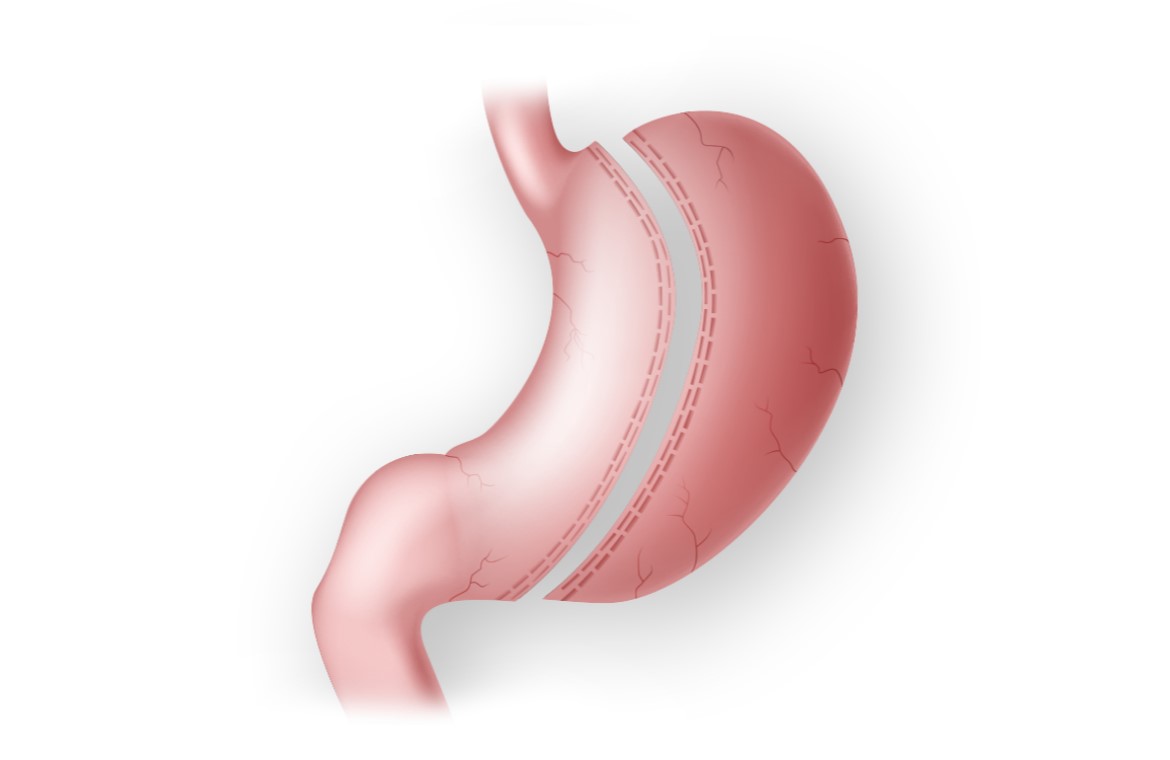Laparoscopic Sleeve Gastrectomy

Laparoscopic sleeve gastrectomy is a weight-loss surgery that divides the stomach longitudinally. This results in the construction of a long, narrow banana-shaped stomach with a significantly limited capacity for food intake. Laparoscopic sleeve gastrectomy surgery operates mostly on the basis of food restriction. Gastric sleeve surgery also speeds up the stomach's emptying process and raises the levels of certain gastrointestinal hormones. These, together with a reduction in the hunger-inducing hormone "Ghrelin," result in weight loss and other metabolic benefits following sleeve gastrectomy surgery.
Over the course of 12 to 18 months, laparoscopic sleeve gastrectomy results in a 65 to 75% decrease of extra weight. This surgery also significantly improves associated co-morbidities such as type 2 diabetes, high blood pressure, high cholesterol, gout, obstructive sleep apnea, and joint problems. Laparoscopic sleeve gastrectomy is one of the most prevalent operations performed in India nowadays. Patients seeking the best laparoscopic sleeve gastrectomy surgery in Ahmedabad can trust experienced surgeons for excellent outcomes.
Eligibility for Laparoscopic Sleeve Gastrectomy
- Laparoscopic sleeve gastrectomy is recommended for Asian candidates with a BMI of ≥ 35 kg/m2 and no accompanying disorders.
- For Asian candidates with a BMI ≥ 30 Kg/m2, bariatric/metabolic surgery should be explored for the treatment of type 2 diabetes or metabolic syndrome if lifestyle changes and medical treatment are insufficient.
- For Asian patients with a BMI ≥ 27.5 Kg/m2, sleeve gastrectomy can be considered a non-primary option for treating poorly controlled type 2 diabetes or metabolic syndrome.
Preparing for surgery
- The first step is a consultation with the doctor and team to determine your eligibility for lap sleeve gastrectomy. At this point, a detailed medical history, diet recall, and a comprehensive physical and psychological evaluation will be conducted.
- Once we've decided to proceed with the laparoscopic sleeve gastrectomy, you'll need to undergo a series of tests. Depending on your clinical profile and co-morbidities, you may also need to consult with specialists like a diabetologist, endocrinologist, nephrologist, or chest physician.
- A pre-operative upper GI endoscopy is required before any bariatric treatment.
- You will need to follow a high-protein liquid diet for 5 to 7 days before the surgery. This helps reduce the size of an enlarged liver, making the procedure safer and more efficient.
On the Day of Surgery
- After completing all necessary tests, you will be admitted to the hospital the evening before your scheduled procedure for lap sleeve gastrectomy.
- All preoperative drugs, including venous thromboembolism prevention, will be administered at the hospital.
- You must fast for 6 to 8 hours before the surgery.
- Laparoscopic sleeve gastrectomy surgery usually takes 45 minutes to an hour to complete and is performed under general anesthesia.
- You will be encouraged to walk and move around on the same day.
- If all goes well, you will be discharged the day after surgery.
What to expect after Laparoscopic Sleeve Gastrectomy
- After the surgery, you will begin a clear liquid diet, progressing to a soft and mashed diet over the next few weeks.
- Nutritional supplements will be required to support your recovery and prevent deficiencies.
- You will develop new dietary habits over time, and the team will support you in adjusting to these changes.
Expected weight loss after Laparoscopic Sleeve Gastrectomy
- After a sleeve gastrectomy, patients typically lose 65 to 75% of their excess weight. Success is influenced by various factors, including baseline weight, age, and adherence to the recommended lifestyle changes.
- Patients who commit to following the lifestyle modifications and recommendations of the team experience better outcomes following any weight loss procedure, including the laparoscopic sleeve gastrectomy.
Downsides of Laparoscopic Sleeve Gastrectomy
- Lap sleeve gastrectomy is not suitable for patients with acid reflux or a hiatus hernia as it can exacerbate reflux symptoms.
- In rare cases, patients may experience weight regain if they do not maintain the recommended lifestyle changes after surgery.
Follow-up after surgery
- Follow-up appointments with your surgeon and medical team are crucial for monitoring recovery and preventing complications. You will need to see the doctor regularly for the first year and annually after that.